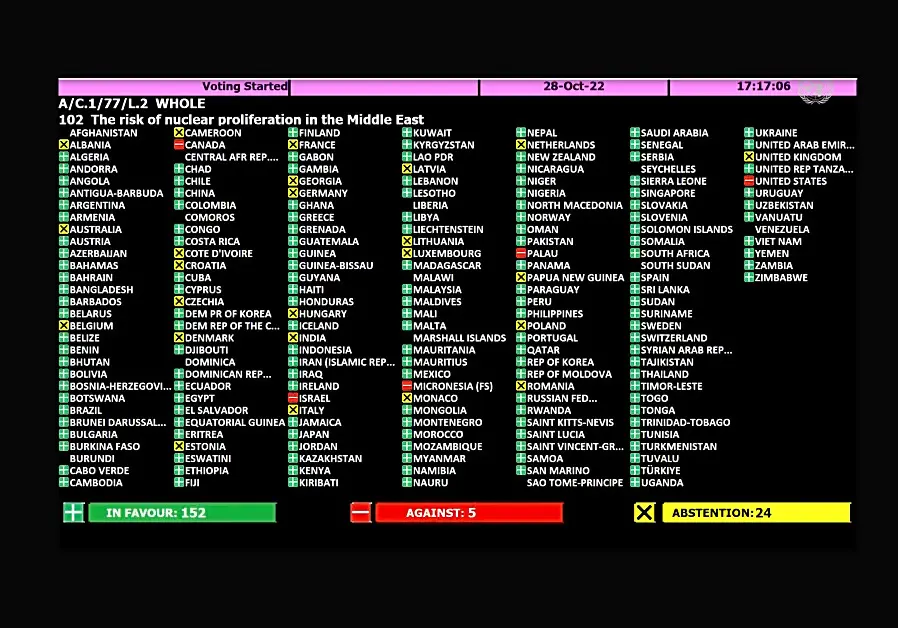Why did this voting take place in the first place?
tl;dr: Israel is one of the few nations not to have signed the Treaty on the Non-Proliferation of Nuclear Weapons, and the only one in the Middle East, and refuses inspections by the International Atomic Energy Agency. The other nations are India (has nukes), Pakistan (has nukes), North Korea (withdrew, has nukes) and South Sudan (too new?). Iran has ratified but is out of compliance.
Israel will not confirm nor deny if it has nuclear weapons, however there is evidence they have had them for some time. The UNGA would like them to follow the treaty (which would involve either denying they have nuclear weapons, or getting rid of what they have) and allow inspections.
This is not without precedence. South Africa and Ukraine had previously possessed nuclear weapons and discarded them in favor of joining the treaty.
This resolution has been voted on repeatedly for a number of years.
Can you explain why Azerbaijan, Ecuador, and Ukraine voted against Israel, as they have good ties with Israel?
They are all non-nuclear states and, presumably, would prefer there not to be a nuclear war. In 1994, Ukraine ratified the Treaty and got rid of its nuclear arsenal.
Can you also explain why Micronesia and Palau voted in favor of Israel?
They are both in the Compact of Free Association with the United States. The United States is a staunch ally of Israel.
What the resolution actually says.
I couldn't find the 2022 version, but here is the 2021 version. What it calls upon Israel to do is...
Noting that 185 States have signed the Comprehensive Nuclear-Test-Ban
Treaty, including a number of States in the region...
...
Reaffirms the importance of Israel’s accession to the Treaty on the
Non-Proliferation of Nuclear Weapons and placement of all its nuclear facilities under
comprehensive International Atomic Energy Agency safeguards, in realizing the goal
of universal adherence to the Treaty in the Middle East;
Calls upon that State to accede to the Treaty without further delay, not to
develop, produce, test or otherwise acquire nuclear weapons, to renounce possession
of nuclear weapons and to place all its unsafeguarded nuclear facilities under full-
scope Agency safeguards as an important confidence-building measure among all
States of the region and as a step towards enhancing peace and security
It lays out its reasons.
Cognizant that the proliferation of nuclear weapons in the region of the Middle
East would pose a serious threat to international peace and security,
Mindful of the immediate need for placing all nuclear facilities in the region of
the Middle East under full-scope safeguards of the Agency,
Recalling the decision on principles and objectives for nuclear non-proliferation
and disarmament adopted by the 1995 Review and Extension Conference of the
Parties to the Treaty on the Non-Proliferation of Nuclear Weapons on 11 May 1995,1
in which the Conference urged universal adherence to the Treaty on the
Non-Proliferation of Nuclear Weapons2 as an urgent priority and called upon all States
not yet parties to the Treaty to accede to it at the earliest date, particularly those States that operate unsafeguarded nuclear facilities,
...
Noting, in this context, the relevant resolutions of the League of Arab States
aiming at the establishment of a Middle East zone free of nuclear weapons and all
other weapons of mass destruction,
...
Recalling that Israel remains the only State in the Middle East that has not yet
become a party to the Treaty
Stressing the importance of taking confidence-building measures, in particular the
establishment of a nuclear-weapon-free zone in the Middle East, in order to enhance
peace and security in the region and to consolidate the global non-proliferation regime,
Emphasizing the need for all parties directly concerned to seriously consider
taking the practical and urgent steps required for the implementation of the proposal
to establish a nuclear-weapon-free zone in the region of the Middle East in accordance
with the relevant resolutions of the General Assembly and, as a means of promoting
this objective, inviting the countries concerned to adhere to the Treaty and, pending
the establishment of the zone, to agree to place all their nuclear activities under
Agency safeguards,
